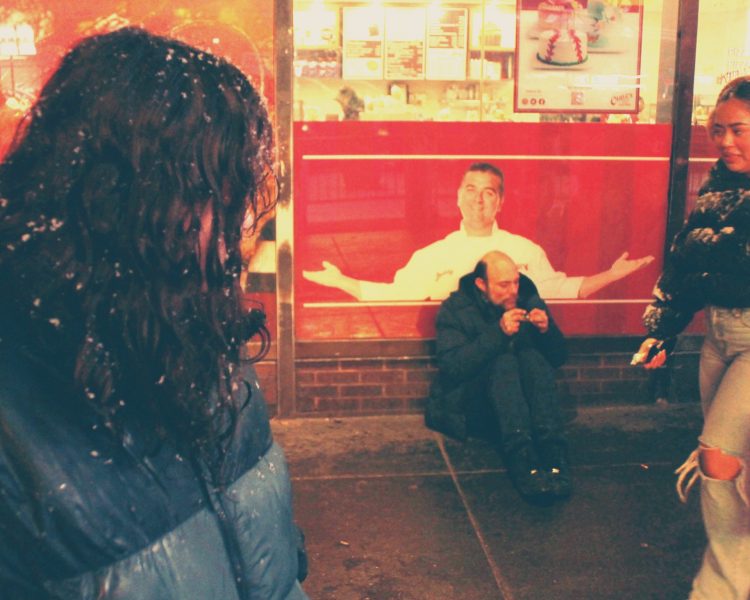Poem for Kilmar Armando Abrego Garcia with Phrases from the News and “America the Beautiful,” Ending with a Line by Keith Douglas
O beautiful a land made safe
and, if not safe, then free
of one more man from somewhere else.
The problem was “an administrative error”.
The problem was Garcia’s Bulls sweatshirt and cap.
The problem was his family’s pupusa business.
The problem was a gang had targeted him for death.
The problem was the majority of Americans didn’t vote.
The problem was the price of eggs.
Bless SMART, the International Association of Sheet Metal, Air, Rail and Transportation Workers…
Here is the statement issued by the Kilmar Abrego Garcia’s union after the Supreme’s Court’s ruling on April 11th.
A Broadside To More Than Half My Country
Grey-filtered morning & no one on the street
looks happy, a few unpleasantly defiant,
the sweep of catastrophe apparent.
This man is in charge of the US military…
(H/t Matthew Cushman)
Last Word
“The Bulwark’s” JVL has been helping anti-Trumpers think through their options. He seems destined to become a stalwart in what’s been dubbed The Defiance.[1] ICYMI, here’s the conclusion of Last’s April 1rst post comparing Elon Musk’s “family values” to those of Kilmar Abrego Garcia—a migrant from El Salvador who has been a loving father to an autistic child. Garcia was deported last month…
One last thing. The federal government now stipulates that it was wrong to deport Kilmar Abrego Garcia to a foreign prison. It admits that it broke the law.
But instead of trying to remedy its error, our government is going to the mat in an attempt to prevent remedy. The government claims in a filing that the president of the United States has no power—none!—over the sovereign nation of El Salvador and could not possibly coerce the country into returning Abrego Garcia to America.
The Party that Calls Us “Groomers” Passes a Law Allowing Genital Inspection of Minors without Parental Consent
Horrors that morons chose begin now.
Flag-draped walls are closing in now.
Whales sleep vertically, holding their breath.
Stars blink on. Hungry birds cry Ruin. Now
Artemis is running out of arrows.
Progress cut off like a foreskin. Now
the virus-spreading chickens have flown home
to roost. We bury the beached dolphin now.
In Yiddish, “vance” is “bedbug.” Pols twist words
like dishtowels. Empathy is sin now.
Say His Name

Here’s 24-year-old Frengel Reyes Mota, a Venezuelan immigrant with no criminal record in the States or in Venezuela.
He’s not part of a gang.
He’s not said anything about Gaza or Israel.
He’s just a house painter who left his home country due to the unrest and difficulties there, and came to the US legally seeking asylum.
He didn’t show up for his asylum hearing this week, though, because when he showed up for his regular ICE check-in — which he should as a legal immigrant in the US — ICE arrested him and soon deported him to the largest prison in Latin America, the notorious Terrorism Confinement Center in El Salvador.
Double or Nothing
Ahmed Fouad Alkhatib (“proud American, native Gazan”) and Dahlia Scheindlin get real about Gaza, Hamas and history of social movements in their commentaries below. Their positions aren’t perfectly aligned, but I’m with him and her…B.D.
Shame on all who failed the protesters in Gaza and ignored their pleas and cries for freedom, dignity, and a future free of Hamas, terrorism, violence, and conflict. Shame on all the “journalists,” “human rights” fraudsters, “pro-Palestine” and “solidarity” activists, college… pic.twitter.com/JelTw974Mn
— Ahmed Fouad Alkhatib (@afalkhatib) March 30, 2025
Why Don’t Gazans Rise Up and Oust Hamas? Dismantling a Deeply Dishonest Claim
By Dahlia Scheindlin
Originally published on March 20 in Haaretz…
In Her Memory (Or, No Other Land)
“No Other Land,” the Oscar-winning documentary about the dailiness of life in Palestinian villages under the brutal, bull-dozing Israeli occupation, hasn’t found a distributor. But settlers on the West Bank are still angry at the film’s notoriety. Last week, they beat up one of “No Other Land’s” four co-directors, Hamdan Ballal, attacking him in his hometown of Susia. That’s one of the villages that Erella Dunayevksy has been visiting regularly for decades. The following letter dates from ten years ago, but its tribute to an unconquerable Palestinian elder is timeless. Perhaps truths from Susia will become news now. May Erella D.’s letters spark committees of correspondence…
Motherland
The author is a college student who wrote this note last month for the first class of a course he’s taking during a term abroad in Senegal…
I hope this course will amplify my experience of daily life here in Dakar. I’m half-Senegalese. My mom is from Kaolack, a smaller city in the center of Senegal. My grandmother and cousin now, however, live in Dakar. My mom also made the trip across the Atlantic with me. She’ll be living in Senegal for the next month. Before the program started, I spent a couple days with my family living in the neighboring city Pikine, in the Technopole. I hadn’t seen my grandmother Mame Aida, cousin Fallou, and Uncle Djibi in ten years.
Pikine is poor. Even before I left America, a friend who had lived in Dakar last year warned me about the area—his stolen phone had ended up geo-locating in the neighborhood. He told me this story without realizing my family had lived in the area. But his sense of Pikine isn’t off base: going between my upper middle-class homestay and my family in Pikine has been jarring. I catch my host mother’s emphasis as she introduces me to her husband: “Khadim est d’origine Pikine.” She lets the caste/class shibboleth sit on her tongue.
Death Facing
Recently I was preparing a talk about my experiences as a former heart-surgery patient, who visits people in the hospital who’ve just undergone one. For my talk, I was asked to detail my heart history, its impact on my life, and how it influenced my visiting.
When I am writing or, in this case, preparing a talk, occurrences in my daily life may walk on like a horn player joining an improvisation. In Muriel Spark’s Momento Mori I read, “I would practice, as it were, the remembrance of death. There is no other practice which so intensifies life.” And then in Han Kang’s Greek Lessons, I found the observation that one who faces death at every turn is best able to think about life. Both Kang and Spark were 40-ish when they wrote their sentences. I don’t know that either’d had a health crisis. Imagine, I thought, what an 83-year-old who’s had several could contribute.
He could say, “I don’t recommend open heart surgery, but you can get a lot out of it.”
Romanticism in Ogallala
“You don’t have to die,” Segarra sings, their timbre plaintive and urgent but knowing and confident on “Alibi” – the first track on Hurray for the Riff Raff’s sublime record The Past is Still Alive from last year – open strings ringing on an acoustic guitar over roundy left-hand piano chords. “If you don’t want to die”, the line continues, a lead guitar a little trembly, a pedal-steely organ somewhere back there too, the arrangement solidly Americana but already giving so much more. “You can take it all back / In the nick of time”: the song is giving love by giving time. Giving time by creating it. Creating it for someone. These two have a history – shared secrets, track marks, New York City, “I love you very much / And all that other stuff.”
I started thinking about Keats (after a few dozen listens) in connection to the next line – “Thawing out my heart like meat” – thinking probably, for reasons that didn’t quite make sense at first, about Keats’s “burning forehead” and “parching tongue” in “Ode on a Grecian Urn,” where the “cold pastoral” of the vase cannot thaw like “all breathing human passion” can. Segarra: “Baby, help me understand.”
Railroad Earth
Norah Jones’ duets with Alynda Segarra on YouTube prompted this comment…
Alynda played a major role in changing my entire life for the better. I was an overworked railroader driving freight trains up and down California when I met her and her band “The Dead Man Street Orchestra” at the time. I had just brought my train into Roseville from Oakland, summer of 2005 I believe. I saw her and 5 bandmates playing their instruments under an old oak tree in a dusty field adjacent to the tracks. Once I got off the train I drove my car back to that field and introduced myself. They were a lovely bunch of folks. We ate together and drank “fancy beers” as they called them. The following morning they were aiming to hop a boxcar heading north and they invited me to ride with them.
Hurray for the Riff Raff!!!
I’ve lost my feeling for rock ‘n’ roll plenty of times since, say, Love You Live or The River or Combat Rock — albums by beloveds that seemed like stiffs in the moment. But rock-is-over raps have never deflated me for long. I’ve learned to trust there’s always something coming in the American night. Mathew Borushko steered me to The Past is Still Alive late last year. It’s my favorite CD from 2024. The opener, “Alibi,” got me open but it’s “Hawkmoon” that made me look up and lock in. There’s the melody as well as a signature line: “I’m becoming the kind of girl they warned me about.” Anyone can tell Alynda Segarra is tuned to what it means to do Americana when the country, which you’ve always been ambivalent about, is headed for a fall. But I had no clue about Alive‘s depths until Matthew B. read me into the songs’ back pages. (Bless him and Alynda for hinting sweet Will was the o-riginal rock and roller…
No motion has she now, no force;
…She neither hears nor sees;
…Roll’d round in earth’s diurnal course,
…With rocks, and stones, and trees.)
Segarra — that Nuyorican devil in a red dress below — has mucho charm. They’re worthy of their home borough (“New York’s most heterogeneous and alive”), the Bronx. Segarra’s range seems pretty astounding (until I recall how many renaissance cats named Richie Torres roam my city). Segarra has rambled from Rican beach to NOLA and all the good aural country in and around. (They like “Heroes” too.) FWIW, the Motherland guitar at the top of the following pre-The Past is Alive Tiny Desk concert is nice as are Van-the-Man strings that kick in in the middle (where this clip starts)…
Current Cinema: “Rustin,” “No Direction Home” & “Hard Truths”
When it comes to bio-pics of 60s heroes, Rustin beats Like a Complete Unknown. Though both flicks suffer from their dependence on simulations of performances that have already been filmed. Rustin builds toward The March on Washington where actors ventriloquize Mahalia Jackson’s gospel and King’s dream. Like a Complete Unknown heads toward a nada take on Dylan at Newport ‘65. (You can hear the real electric thing ((“Let’s Go!…All right!”)) and even watch footage of Bloomfield wailing with Dylan as a Chicago blues all-star rhythm section drives them hard.)[1] Timothy Chalamée has been praised for learning how to play Dylan’s songs, but he can’t put them across. None of his performances touch the indelible scene in Inside Lewelyn Davis where a folkie takes his best shot and fails to move an Albert Grossman type: “I don’t see a lot of money here.”
In the fields
I never told them
How I’d grown up
Out in the fields.
Walking up through the woods
Beyond the swamp with cattails
And the old willow with one
Sideways trunk,
And snapweeds,
Across the stream, then up
